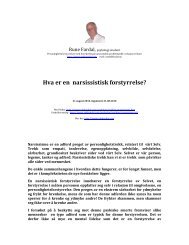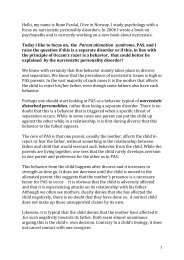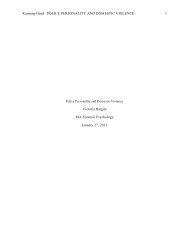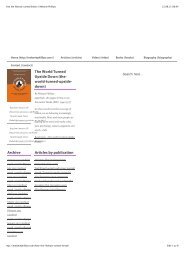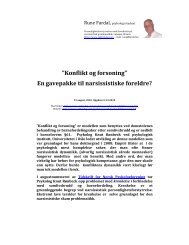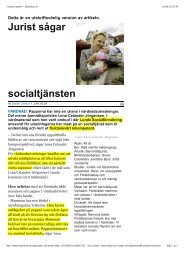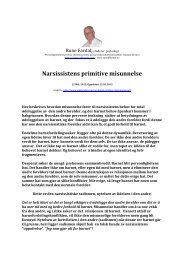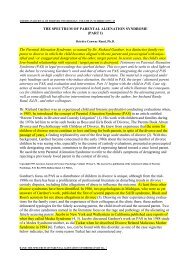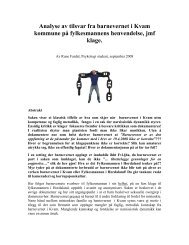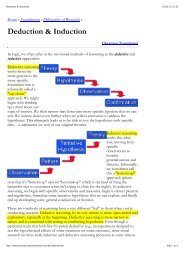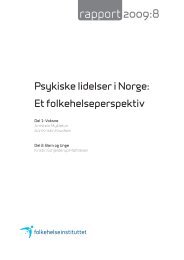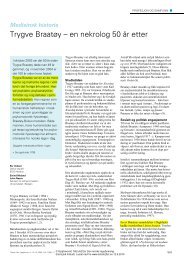The origins of narcissism and narcissistic personality disorder a
The origins of narcissism and narcissistic personality disorder a
The origins of narcissism and narcissistic personality disorder a
You also want an ePaper? Increase the reach of your titles
YUMPU automatically turns print PDFs into web optimized ePapers that Google loves.
THE ORIGINS OF NARCISSISM 77<br />
as, in Kohut’s (1977, p. 99) phrase, “a center <strong>of</strong> initiative <strong>and</strong> a recipient<br />
<strong>of</strong> impressions” <strong>and</strong> (b) objective self-awareness, or observations <strong>of</strong><br />
oneself as an object among other objects, a self among selves. Reflexive<br />
self-awareness, or self-reflexivity, is the capacity to integrate these distinct<br />
sources <strong>of</strong> knowledge-to move easily between subjective <strong>and</strong><br />
objective perspectives on the self. As such, it is the opposite <strong>of</strong> egocentrism<br />
(Piaget, 1924/1952, 1926/1960, 1937/1954). Because one<br />
cannot simultaneously regard oneself as an object <strong>and</strong> immerse oneself<br />
in one’s own subjectivity, except perhaps during mystical experiences<br />
or states <strong>of</strong> ecstasy, <strong>and</strong> because these two modalities for self-knowledge<br />
can result in highly discrepant self-images, the capacity for reflexive<br />
self-awareness necessarily produces psychological tension <strong>and</strong><br />
conflict, especially about one’s conception <strong>of</strong> oneself (Lichtenstein,<br />
1963).<br />
A Definition <strong>of</strong> Narcissism in Terms <strong>of</strong> Self-Reflexivity<br />
Narcissism is here defined as the attempt to escape, whether through<br />
self-enhancement or self-effacement, the conflicts that result from selfreflexivity-to<br />
replace a necessary division within the self with an illusory<br />
oneness. It thus shares much with Rothstein’s (1984) ego-psychological<br />
definition <strong>of</strong> <strong>narcissism</strong> as the pursuit <strong>of</strong> the felt experience<br />
<strong>of</strong> perfection. On the other h<strong>and</strong>, in seeing self-reflexivity <strong>and</strong> the<br />
concomitant experience <strong>of</strong> separateness as factors fundamental to the<br />
tensions underlying <strong>narcissism</strong>, this approach rejects the notion <strong>of</strong> a<br />
tensionless developmental period, whether before or after birth. It further<br />
rejects the notion that a drive to recover a prenatal state underlies<br />
the yearning for oneness (Lachmann & Beebe, 1989). <strong>The</strong> conceptual<br />
roots <strong>of</strong> this reformulation are in object-relations theory, developmental<br />
psychology, social cognition, <strong>and</strong> Lacanian theory, rather than<br />
ego psychology. Most essential to this account are the writings <strong>of</strong> Bach<br />
(1985), Blatt (1974, 1983; Blatt & Shichman, 1983), Broucek (1982),<br />
Westen (1990a), <strong>and</strong> other commentators who have explored the relationships<br />
among self-reflexivity, egocentrism, <strong>and</strong> <strong>narcissism</strong>.<br />
Although objective self-awareness is a complex skill, its crucial feature,<br />
from the st<strong>and</strong>point <strong>of</strong> this reconceptualization <strong>of</strong> <strong>narcissism</strong>, is<br />
that it creates a state <strong>of</strong> psychological tension or <strong>of</strong> negative affect.<br />
Duval <strong>and</strong> Wicklund (1972), in their empirical analysis <strong>of</strong> the differences<br />
between objective <strong>and</strong> subjective self-awareness, propose that




